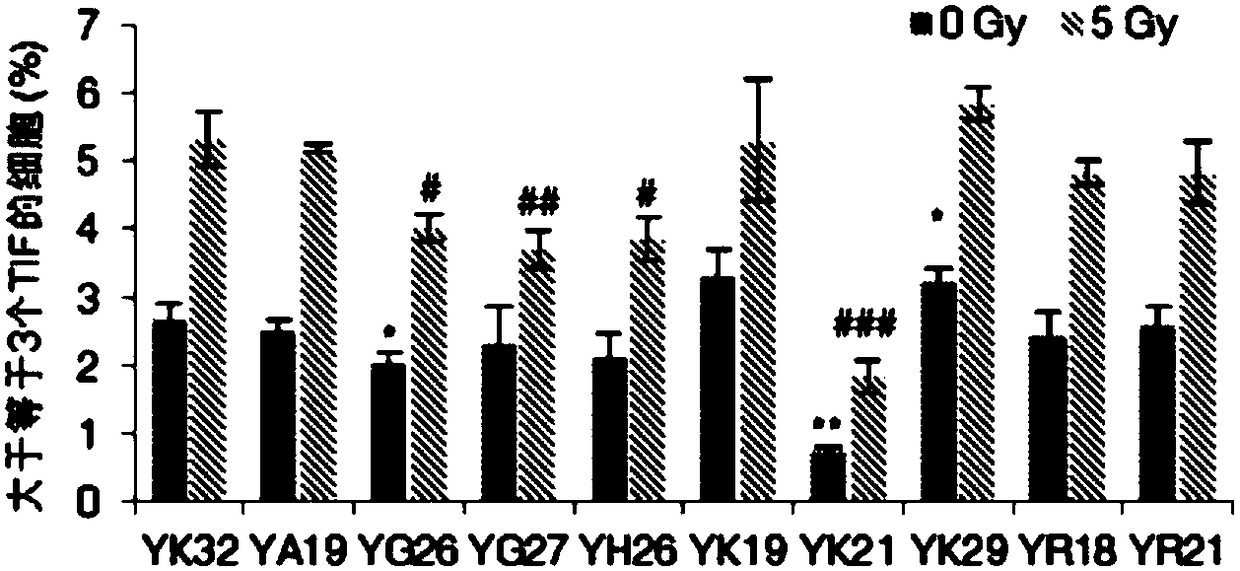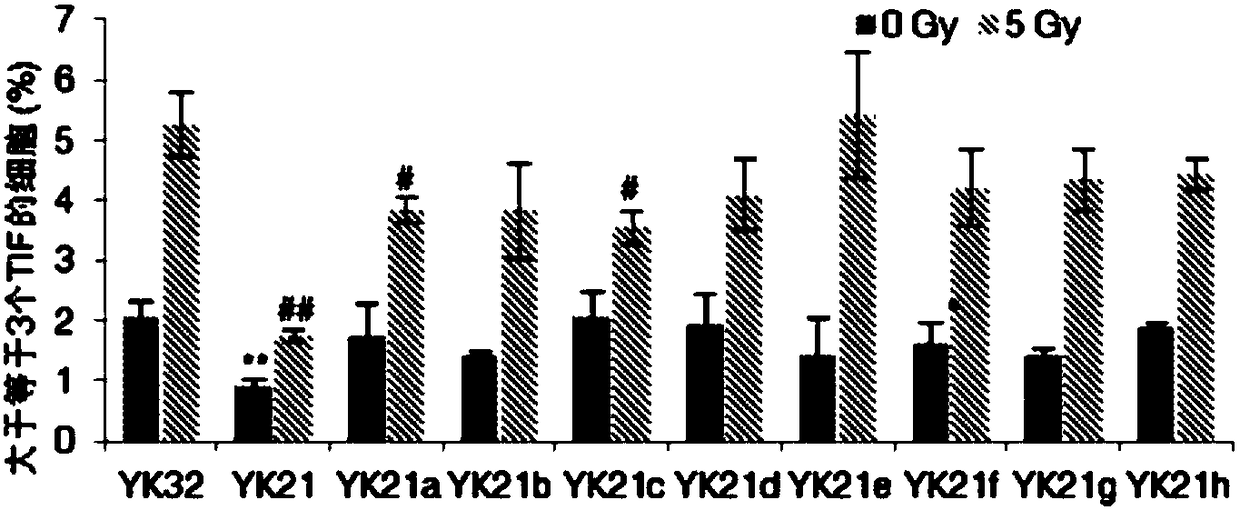Polypeptide for preventing and treating diseases relevant to telomere function abnormity and medical purpose
A technology of abnormal function and telomeres, which can be used in medical preparations containing active ingredients, pharmaceutical formulations, respiratory diseases, etc., can solve the problem of incompletely clear inhibition of FBW7, and achieve the increase and improvement of pulmonary respiratory function. The effect of amplifying and prolonging life
- Summary
- Abstract
- Description
- Claims
- Application Information
AI Technical Summary
Problems solved by technology
Method used
Image
Examples
Embodiment 1
[0019] Example 1 Application of TELODIN Polypeptide to Inhibit Telomere Damage, Chronic Obstructive Pulmonary Disease and Pulmonary Fibrosis
[0020] Experimental objects: Human cervical cancer cell Hela, 18 wild-type mice aged 3-6 months
[0021] Experimental method: After Hela cells were treated with multiple polypeptides (Table 2, SEQ ID No.1-21) for 4 hours, the cells were treated with 0Gy and 5Gy respectively, and after 1 hour, the cells were taken to detect telomeres by immunofluorescence combined with in situ hybridization DNA damage; 18 wild-type mice were divided into 6 groups, 3 in each group, mice were treated as follows, tracheal perfusion with TELODIN polypeptide (SEQ ID No.1, TyrGlyArgLysLysArgArgGluArgArgArgGlySerArgAsnGlyThrGluGluThrLys, name YK21) or control peptide (SEQ ID No.2, TyrGlyArgLysLysArgLgTluTluArglugArgArgGlys) , name YK21h, 1mg / kg body weight), tracheal infusion of bleomycin (3mg / kg body weight) after 4 hours, another two groups of mice were infus...
Embodiment 2
[0029] Example 2 Application of TELODIN Polypeptide to Inhibit Telomere Damage, Chronic Obstructive Pulmonary Disease and Pulmonary Fibrosis
[0030] Experimental objects: 24 wild-type mice aged 3-6 months
[0031] Experimental method: 12 wild-type mice were divided into 4 groups, with 3 mice in each group. The mice were treated as follows, and the trachea was infused with TELODIN polypeptide (SEQ ID No.25, SerArgAsnGlyThrGluGluThr, name ST8) or control peptide (SEQ ID No.24, GlySerArgAsnGlyThrGluGlu , name GE8, 1mg / kg body weight), tracheal perfusion of bleomycin (3mg / kg body weight) after 4 hours, tracheal intubation was performed on mice to detect respiratory function after 21 days; type II cells were sorted by flow cytometry, and statistics Percentage of type 2 cells; Extract lung tissue RNA, real-time quantitative PCR to detect the mRNA expression of NG2, T1α, s100a4, α-SMA and Col6a; Extract lung tissue protein, Western blot to detect the expression of FBW7, TPP1, α-SMA ...
Embodiment 3
[0033] Example 3 Application of TELODIN Polypeptide to Prevent Skin Aging, Weight Loss and Premature Death Caused by Radiation Damage
[0034] Experimental objects: 48 wild-type mice aged 2-4 months
[0035] Experimental method: 48 wild-type mice were randomly divided into 4 groups, 12 in each group. Firstly, the hair removal area on the back of all the mice is about 2×2 cm. Each group of mice was treated as follows: two groups of mice were not subjected to X-ray irradiation treatment, and TELODIN polypeptide (SEQ ID No. 19, TyrGlyArgLysLysArgArgGluArgArgArgGlySerArgAsnGlyThrGluGluThrLys, name DYK21) or control polypeptide (SEQ ID No. name AT22), for 7 consecutive days. 另两组小鼠每天在分别涂抹含有每天分别涂抹TELODIN多肽(SEQ ID No.19,TyrGlyArgLysLysArgArgGluArgArgArgGlySerArgAsnGlyThrGluGluThrLys,名称DYK21)或对照多肽(SEQ ID No.28,AlaCysThrGlySerThrGlnHisGlnCysGlyGlyGlyGlySerArgAsnGlyThrGluGluThr,图中名称AT22),四小时后进行4Gy X-ray exposure for 7 consecutive days. Photographs were taken and weighed daily. On the...
PUM
 Login to View More
Login to View More Abstract
Description
Claims
Application Information
 Login to View More
Login to View More - R&D
- Intellectual Property
- Life Sciences
- Materials
- Tech Scout
- Unparalleled Data Quality
- Higher Quality Content
- 60% Fewer Hallucinations
Browse by: Latest US Patents, China's latest patents, Technical Efficacy Thesaurus, Application Domain, Technology Topic, Popular Technical Reports.
© 2025 PatSnap. All rights reserved.Legal|Privacy policy|Modern Slavery Act Transparency Statement|Sitemap|About US| Contact US: help@patsnap.com



